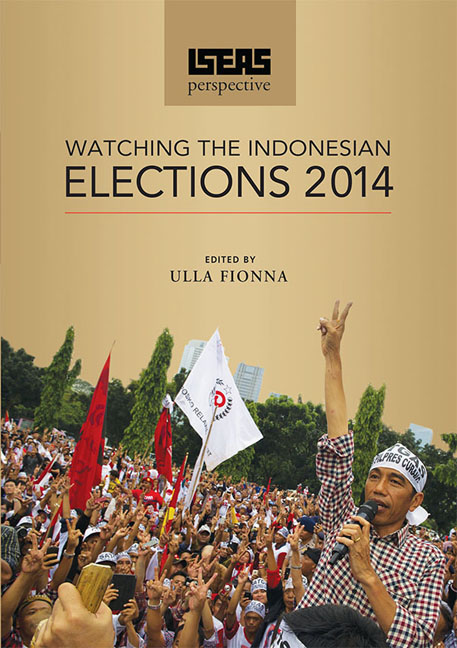Book contents
- Frontmatter
- Contents
- Foreword
- Introduction
- 1 The Gubernatorial Race in Jakarta: Background and Implications
- 2 Indonesian Parties Struggle for Electability
- 3 Who Will Be Indonesian President in 2014?
- 4 Indonesian Presidential Election Forcing Rejuvenation of Parties
- 5 Resisting Democracy: Front Pembela Islam and Indonesia's 2014 Elections
- 6 Getting to Know the Contestants of the 2014 Indonesian Parliamentary Elections
- 7 A Snapshot of the Campaigning in Indonesia's 2014 Legislative Elections
- 8 Unpacking the Results of the 2014 Indonesian Legislative Elections
- 9 Indonesia's 2014 Legislative Elections: The Dilemmas of “Elektabilitas” Politics
- 10 The Islamic Factor in the 2014 Indonesian Elections
- 11 Vote-buying in Indonesia's 2014 Elections: The Other Side of the Coin
- 12 Gap Narrows Between Candidates in Indonesian Presidential Elections
- 13 Analysing the Economic Platforms in the Indonesian Presidential Election
- 14 Indonesian Islamic Parties After the 2014 Elections: Divided and Self-Centred
- 15 Safeguarding Indonesia's Pluralism: An Essential Task for Joko Widodo
- 16 Jokowi's Key Economic Challenge: Improving Fiscal Policy for Equitable Growth
- 17 Crossing the River While Avoiding the Stones: Jokowi's Run-up to the Presidency
- 18 Post-elections Indonesia: Towards a Crisis of Government?
- Epilogue: Jokowi's First Months: Compromise Cabinet, Subsidy Cuts, and Corrupt Coalition
18 - Post-elections Indonesia: Towards a Crisis of Government?
Published online by Cambridge University Press: 29 July 2017
- Frontmatter
- Contents
- Foreword
- Introduction
- 1 The Gubernatorial Race in Jakarta: Background and Implications
- 2 Indonesian Parties Struggle for Electability
- 3 Who Will Be Indonesian President in 2014?
- 4 Indonesian Presidential Election Forcing Rejuvenation of Parties
- 5 Resisting Democracy: Front Pembela Islam and Indonesia's 2014 Elections
- 6 Getting to Know the Contestants of the 2014 Indonesian Parliamentary Elections
- 7 A Snapshot of the Campaigning in Indonesia's 2014 Legislative Elections
- 8 Unpacking the Results of the 2014 Indonesian Legislative Elections
- 9 Indonesia's 2014 Legislative Elections: The Dilemmas of “Elektabilitas” Politics
- 10 The Islamic Factor in the 2014 Indonesian Elections
- 11 Vote-buying in Indonesia's 2014 Elections: The Other Side of the Coin
- 12 Gap Narrows Between Candidates in Indonesian Presidential Elections
- 13 Analysing the Economic Platforms in the Indonesian Presidential Election
- 14 Indonesian Islamic Parties After the 2014 Elections: Divided and Self-Centred
- 15 Safeguarding Indonesia's Pluralism: An Essential Task for Joko Widodo
- 16 Jokowi's Key Economic Challenge: Improving Fiscal Policy for Equitable Growth
- 17 Crossing the River While Avoiding the Stones: Jokowi's Run-up to the Presidency
- 18 Post-elections Indonesia: Towards a Crisis of Government?
- Epilogue: Jokowi's First Months: Compromise Cabinet, Subsidy Cuts, and Corrupt Coalition
Summary
INTRODUCTION
On 25 September 2014, the Indonesian People's Representative Council (Dewan Perwakilan Rakyat, DPR) passed legislation ending the direct election of governors, bupati (regent/district head) and mayors. This new legislation returns the electoral process for these positions to that which was employed during the New Order period and until 2004. Under this old-new process, the municipal, district and provincial legislative councils (Dewan Perwakilan Rakyat Daerah, DPRD) will be the ones voting for these positions. The results of the vote will then be sent to the President, who will then appoint these officials. Significantly, the positions of bupati and mayor have become much more important over the last ten years as a result of the various decentralization laws, which allocate substantial budgetary powers to the legislative councils and administrations at the municipal and district levels.
The passing of this law was the result of an assertive campaign in parliament by the Red and White Coalition (Koalisi Merah Putih, KMP), comprising of the parties that nominated Prabowo Subianto as candidate in the recent presidential election. In the election, Subianto lost by a narrow margin to Joko Widodo — 47 per cent to 53 per cent, a difference of 8 million votes out of 190 million. Subianto was nominated by his own party, Gerindra, Golkar, the Prosperous Justice Party (Partai Keadilan Sejahtera, PKS), the National Mandate Party (Partai Amanat Nasional, PAN) and United Development Party (Partai Persatuan Pembangunan, PPP). Widodo was nominated by the Indonesian Democratic Party – Struggle (Partai Demokrasi Indonesia Perjuangan, PDI-P), the Nasional Democratic Party (Nasdem), the National Awakening Party (Partai Kebangkitan Bangsa, PKB), the Peoples’ Conscience Party (Partai Hati Nurani Rakyat, Hanura) and the Unity and Justice Party of Indonesia (Partai Keadilan dan Persatuan Indonesia, PKPI). The passing of the law will very likely deliver governor positions to KMP nominees in thirty-one out of thirty-four provinces. Should this come about, it would provide an additional strong platform from which the KMP can oppose the Widodo–PDI-P–led government and try to implement its own policy agenda.
Another party with a substantial number of seats is the Democratic Party (Partai Demokrat, PD), headed by incumbent President Yudhoyono. Most of the PD members walked out during the vote for the bill, effectively abstaining, which gave the KMP a majority in the parliament.
- Type
- Chapter
- Information
- ISEAS PerspectiveWatching the Indonesian Elections 2014, pp. 166 - 176Publisher: ISEAS–Yusof Ishak InstitutePrint publication year: 2015



